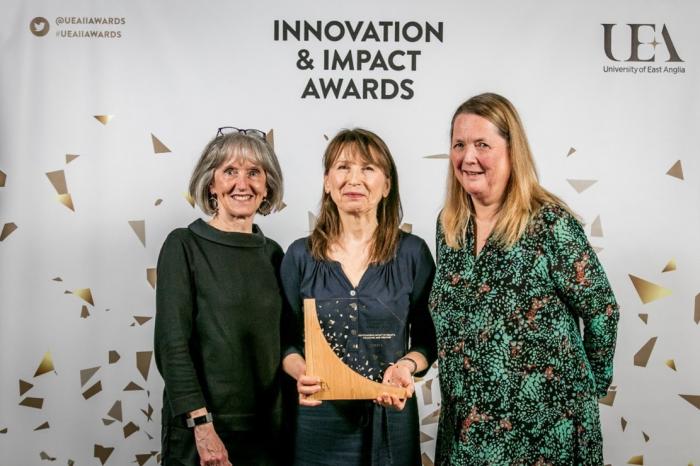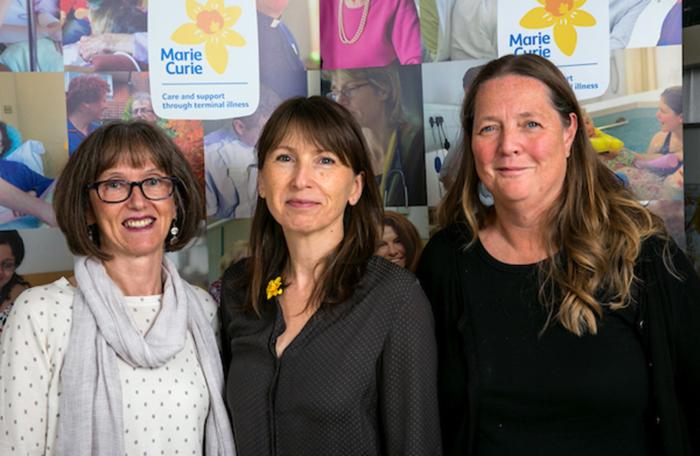An award-winning approach developed with ARC East of England researchers is helping to empower people with long term conditions using health services, and has been developed further to support people with mental health conditions and in prison settings.

Research lead and Professor of Palliative Care Research at the University of East Anglia Morag Farquhar (centre) shared how the project started and what it has achieved so far.
The Support Needs Approach for Patients (SNAP) is a healthcare intervention designed to help people identify the unmet support needs that are most important to them at that point in time. They can then discuss these needs with a healthcare professional trained in SNAP and work together to address them, enabling person-centred care.
Unmet support needs can have a negative impact on people’s quality of life when they are managing long term conditions. They can be linked to anxiety and depression, poor adherence to treatment, higher dependence on unpaid/family carers, and isolation. Health policy and guidance recommend that patients’ needs are assessed and addressed but rarely tells us how to do it.
SNAP was developed to support clinicians and patients to do this together and help to start open conversations around support needs with the evidence-based validated SNAP Tool. This short and simple tool helps clinicians navigate their own concerns about how to ask about support needs, the best time to do this and explore sensitive issues whilst ensuring patients can share their needs without feeling guilty, normalising or minimising those needs, and worrying about limited clinical time.
The idea for SNAP germinated in 2012-16 through Farquhar’s NIHR Career Development Fellowship alongside a Marie Curie funded project which highlighted the lack of person-centred care for patients with chronic lung disease. An intervention was clearly needed to help them identify and discuss their support needs with healthcare professionals. The Carer Support Needs Assessment Tool Intervention developed for unpaid/family carers by colleagues at Cambridge (Dr Gail Ewing) and Manchester (Professor Gunn Grande) guided the development of SNAP and the research team formed with Dr Carole Gardener (pictured right above) and Dr Gail Ewing (left).
The team gained funding from the NIHR School for Primary Care Research in 2015 for foundational work to develop the original SNAP Tool and five-stage intervention, which were fully developed and piloted with funding from the Marie Curie Research Grant Scheme. NIHR ARC East of England funding has supported the adaptation of the SNAP Tool to use with mental health service users in a range of mental health care settings.
It has been vital that the development and adaptation of SNAP was informed by people with relevant experiences, unpaid/family carers (family and friends who help and support patients) and health care professionals. Patient and Public Involvement (PPI) and work with NHS staff took place before, during and after each of the SNAP studies. They helped to develop and refine the original tool (for patients with chronic or progressive conditions) and adapt it for mental health service users, ensuring SNAP and the tools are relevant, acceptable and suitable for both patients and health professionals in clinical practice.
The tool sits in a booklet (titled How are you?) which contains the brief set of questions covering the broad areas of support needs that patients have. There are 15 questions in the original SNAP Tool (for chronic or progressive conditions) and 17 questions in the mental health version (the SNAP-MH Tool), which was adapted from the original tool by working with mental service users and clinicians. This was in direct response to NHS staff requests to use this tool for holistic mental health assessments, whilst recognising that some of the tool’s questions and the way SNAP worked needed to be tailored for this group.
Morag said: “We know from our previous work that in mainstream healthcare SNAP enables people to identify comprehensive support needs, and to say what’s most important to them at that time, and what might help.
"It stops clinicians making assumptions about the patient, what they may need or trying to fix things for them, while helping patients to solve problems. We found the approach effectively supports holistic conversations about needs, making care and support more visible and person-centred."
Professor Morag Farquhar, SNAP research lead
“We now need to understand if SNAP adapted for mental health (SNAP-MH) can achieve the same outcomes, and also whether SNAP can be adapted and implemented in prison health care, which is the next phase of the project supported by ARC East of England and funded by Marie Curie.”
Both tools are short and simple to use and underpin the five-stage SNAP intervention designed to deliver person-centred care in clinical practice. They can also be used independently in research studies to identify patients’ unmet support needs. The dedicated SNAP website provides free training for clinicians, links to access SNAP resources and request a SNAP Tool licence which is free to not-for-profit organisations. The team is currently working with Health Innovation East and ARC East of England to expand roll out of SNAP in healthcare services across the region.
The following feedback highlights the impact SNAP has had for patients and staff:
“It just couldn’t be simpler to fill in. It asks all the right questions… and some that are probably never asked. Without the tool I wouldn’t have thought about these issues… so it did help… sitting and talking about these issues does help. ‘Dealing with feeling and worries’… it’s not something in my yearly appointment that would normally come up”
COPD patient: SNAP2
“[The patient’s] issues are loneliness and getting out and about, and it did evolve to discussions on anxiety… so from that it triggered me to refer on to [local services]… so it was really useful [and] helped initiate quite a few things”
Community nurse: SNAP2
“[It] did prompt me to ask some more questions with [the nurse]… and that was a good thing. [The appointment] went a bit deeper this time, which was what I really needed… this was something that I hadn’t really understood in the past, that I should have a few more questions and now I have I feel a lot happier about everything …it’s knowing what you want to know and [the tool] did help”
COPD patient: SNAP2
“Just seen a patient with SNAP booklet [and I was] nearly moved to tears. Can’t thank you enough for the booklet – conversation we had would not have happened without it […] [The] consultation was special. We had spoken about his feelings/mood during the last appointment. SNAP meant he came back. Honestly, I could have cried”
Practice nurse: SNAP2
SNAP won a University of East Anglia Innovation and Impact Award in 2023 for Outstanding Impact in Health, Wellbeing and Welfare and was also included in Marie Curie’s 2023 Research Impact Report (pages 36-37). SNAP’s adaptation for mental health care was listed as one of the top three significant achievements across the ARC East of England in the NIHR annual report (2023/24).
SNAP Tool licences have been issued internationally for primary care surgeries, community care teams, hospitals, and hospices. The original SNAP Tool has been translated into Swedish, Portuguese, and traditional Chinese. SNAP (using the original SNAP Tool) is cited in European guidelines for palliative care for people with chronic obstructive pulmonary disease or interstitial lung disease and the British Lung Foundation’s Taskforce for Lung Health.
The project to adapt and take SNAP into prison healthcare starts in September 2024. PPI work with former prisoners found that talking about support needs can be difficult in prison, and person-centred conversations rarely happen. Former prisoners and prison nurses say SNAP could work if adapted to fit around the challenges of prison settings. Former prisoners with long-term health conditions helped to develop the SNAP in Prisons study as PPI advisors and will help deliver it.
Funded by Marie Curie, and supported by ARC East of England, the project will review evidence and best practice for involving prisoners in conversations about their health needs and adapt the SNAP Tool and SNAP process for this group. SNAP in Prisons is led by Morag Farquhar and Carole Gardener at the University of East Anglia School of Health Sciences, and the team includes experts in prison research and healthcare from Manchester and Derby universities, EP:IC (prison research consultants), and prison healthcare teams. They will be asking clinicians, prison staff and imprisoned patients/former prisoners how SNAP might work in prisons, developing and testing a new version of the SNAP Tool in a small number of prisons and finding the best ways to test it across a wider range of prisons.
- Visit the SNAP website to learn more, access SNAP’s free online training and request a licence to use the SNAP Tool in clinical practice, in research, or in teaching, or request to translate it into another language.
- Find out more about the SNAP research project with ARC East of England.


